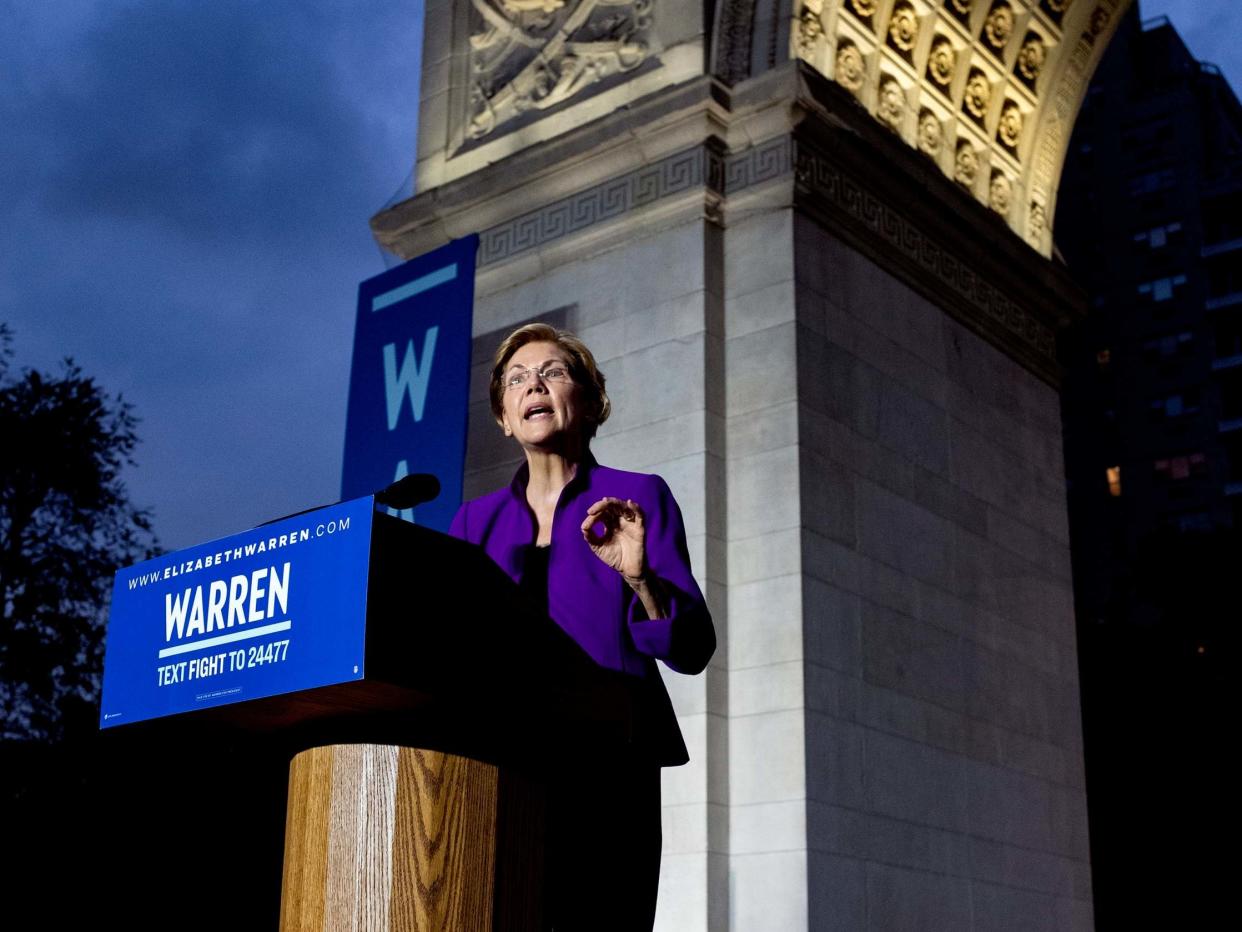What happens when the Democratic candidacy becomes a war between Bernie Sanders and Elizabeth Warren?

Democratic insiders have worried for months that polls may be overstating Joe Biden’s advantage over a resurgent left led by Bernie Sanders and Elizabeth Warren. In May, Biden held the high ground, commanding support from 41 per cent of Democrats nationally. Just a few months later, his share has fallen to 26 per cent. Nearly a third of voters who supported Biden four months ago now support another candidate. The main beneficiaries of Biden’s decline? Sanders and Warren.
Warren’s rise is bolstered by strong debate performances and massive rally crowds. According to political prediction market PredictIt, Warren is the odds-on favorite to win the Democratic nomination. Much of Warren’s success comes from the strength of her policy arguments – so far she has avoided the ‘moderate vs. progressive’ arguments that wrap other candidates into knots.
Sanders is struggling to recapture the momentum of his 2016 campaign, but has maintained solid standings in a slew of recent state and national polls. The promised Sanders summer surge never materialized, but with over $18 million available and a formidable national network, Sanders can afford to sit in second place as competitors struggle for increasingly focused donor cash.
But can the progressive wing of the Democratic Party survive a potential Warren vs. Sanders matchup so soon after finding its voice?
On the surface, Sanders and Warren are obvious allies. Both champion congressional Green New Deal legislation. Both have made healthcare a tentpole of their campaigns. Both have aggressively campaigned for the endorsement of Rep. Alexandria Ocasio-Cortez, arguably the most influential progressive Democrat not on the presidential debate stage.
Warren and Sanders have avoided directly attacking each other so far, but as moderate candidates exit the field, each will face growing pressure to lay sole claim to the enthusiasm – and votes – of the party’s energized progressive base.
For Sanders, “Bernie Bros” still pose a unique problem. Those largely male supporters gained a nightmare reputation in 2016 due to the misogynistic attacks they lobbed at Clinton and any critics of Sanders-style Democratic Socialism. That Warren is ideologically far closer to Sanders than to Clinton makes no difference for those in the “Bernie or Bust” crowd.
Repeating the scorched-earth Bernie Bro tactics of 2016 may backfire disastrously with a Democratic base subjected to years of Donald Trump’s verbal assaults against women. Bernie Bros remain a major part of the Bernie Sanders cultural experience. Whether he can instill enough discipline in them to avoid an open party war remains to be seen.
The problem is greater than just overzealous, ill-mannered men. The 2020 Democratic field overflows with qualified women – but Sanders supporters have shifted the goalposts once again. In 2016, Sanders supporters like Susan Sarandon said they would happily vote for a woman – just not centrist Hillary Clinton. Sarandon held up Elizabeth Warren as her ideal candidate. Three years later, with Warren now an option, Sarandon drew fire for telling a Sanders rally that Warren was essentially unfit for the job.
Sanders supporters are understandably frustrated: after moving the Democratic Party to a progressive position many insiders considered a fantasy, Bernie Sanders finds himself facing candidates motivated by the strength of his message. Now he risks being eclipsed by Warren, who combines Sanders’s populist message with more
charisma and stronger policy bona fides.
Just this week, Sanders lost a major endorsement from the progressive Working Families Party to Elizabeth Warren. WFP National Director Maurice Mitchell said the organization decided to make an early endorsement partly to head off a potential progressive vs. progressive war of attrition.
Mitchell isn’t the only progressive activist worried about what a Sanders/Warren fight might mean for the left. After the Working Families Party announcement, The Atlantic reported that a growing number of Sanders supporters are moving to Warren to defuse a brewing civil war over who ought to lead progressives into 2020.
The idea of a progressive Democratic base strong enough to foment a primary crisis seemed like a fantasy in 2016. One cycle later and voters are faced with an abundance of choice on the left – on everything from healthcare policy to climate change and criminal justice reform. All that remains is for them to unite behind a single voice.
That choice may prove harder than they anticipated. Let’s hope it doesn’t lead to a replay of 2016.

 Yahoo News
Yahoo News 
